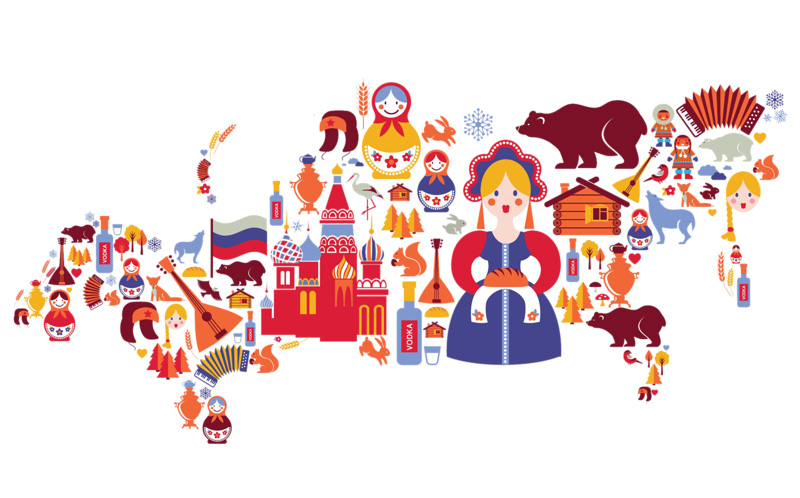Among the languages with the greatest geopolitical, economic, and cultural presence is Russian, spoken by over 250 million people worldwide, both as a native and foreign language. In this context, Russian translations play a key role in diverse sectors such as diplomacy, industry, trade, technology, science, and public administration.
Why is the Russian language relevant?
Russian is the official language of Russia, Belarus, Kazakhstan, and Kyrgyzstan, and is also widely used in Eastern Europe, the Caucasus, and Central Asia. It is also one of the six official languages of the United Nations, reinforcing its strategic role in international relations. It is not just a national language, but a vehicular language in multiple political and economic contexts.
Therefore, Russian translations are not only necessary within Russian borders but are also a fundamental tool for interacting with communities, governments, businesses, and institutions that use this language in their daily lives or official operations.

Practical applications of Russian translations
The areas where Russian translations are required are vast. From legal documents to technical manuals, financial reports, engineering projects, academic certificates, business contracts, and corporate presentations. Below are some of the most common uses:
1. Business and commercial documentation
Companies operating in Russian-speaking markets. Whether importing products, offering services, or opening branches abroad need to translate contracts, terms and conditions, distribution agreements, and corporate documentation. In this field, a precise Russian translation can be decisive for closing deals, meeting legal requirements, or avoiding misunderstandings that could lead to commercial disputes.
2. Legal and notarial translations
The legality of many documents, such as powers of attorney, court rulings, company bylaws, or marriage certificates, depends on their official translation. Certified or sworn translators must produce Russian translations of this type with rigor and accuracy to ensure their validity before official institutions.
3. Technical and industrial translation
The technical field requires a deep understanding of specific terminology in sectors such as engineering, automotive, robotics, electronics, or mining. Russian translations in these cases must not only be linguistically correct but also technically coherent. A mistake could have serious consequences in machinery assembly, system installation, or process execution.
4. Medical and scientific translations
In the medical, pharmaceutical, and scientific sectors, accuracy is essential. Translating clinical reports, drug instructions, clinical trials, or research protocols into Russian requires both language mastery and subject matter expertise. Any ambiguity could compromise health or research outcomes.
5. Administration and education
Migration and academic exchange also generate high demand for Russian translations. Diplomas, academic certificates, residence permits, identity documents, or government forms must be translated with complete fidelity to the original.
Challenges of Russian translations
Russian is a complex language for speakers of Romance languages such as Spanish. It presents significant differences at the phonetic, grammatical, and morphological levels. Its Cyrillic alphabet is already a first obstacle for those unfamiliar with it, and its grammar featuring cases, declensions, and a unique verbal system can make literal translation difficult.
A distinctive feature is the use of six grammatical cases, which alter the endings of nouns and affect sentence structure. Additionally, the Russian verbal system distinguishes between perfective and imperfective aspects, which have no direct equivalent in Spanish. This forces translators to interpret context very carefully to avoid altering the original meaning.
It’s also important to note that many administrative, technical, or legal concepts in Russian have no direct equivalent in Spanish, requiring interpretive work to maintain both accuracy and natural language flow in the target language.
Automatic translation vs. professional Russian translations
Although machine translation tools have improved significantly, they still present limitations when it comes to Russian translations. Grammatical nuances and the complexity of the language often result in translations that are inaccurate or simply incorrect.
Moreover, machine translation does not consider elements such as tone, text purpose, formality, or cultural context. All of which are crucial for high-quality translations. For this reason, when dealing with sensitive or professional documents, relying on an experienced translator remains the best option.

Russian translations: why trusting a professional translation agency is key
Russian translations are not just about converting words between languages. They are a technical, contextual, and strategic task. Their importance in commerce, industry, diplomacy, education, and healthcare makes them essential for effective communication between countries, people, and organizations.
Given the complexity of the language and the importance of the documents typically involved, this work cannot be improvised or left to automation without supervision. Precision, expertise, and cultural sensitivity are essential to deliver translations that truly serve their purpose: enabling understanding between different worlds.
That’s why working with a professional translation agency is essential when it comes to Russian translations. An agency can offer not only experienced translators but also a thorough review and quality control process that ensures fidelity and professionalism in every translated text.
If you’re looking for language solutions that combine accuracy, technical knowledge, and attention to detail, Max Traducciones is an option worth considering. Our team is ready to face the challenges of the Russian language and provide translations that are clear, effective, and tailored to your needs.
Contact us today and request a free quote. No strings attached.



